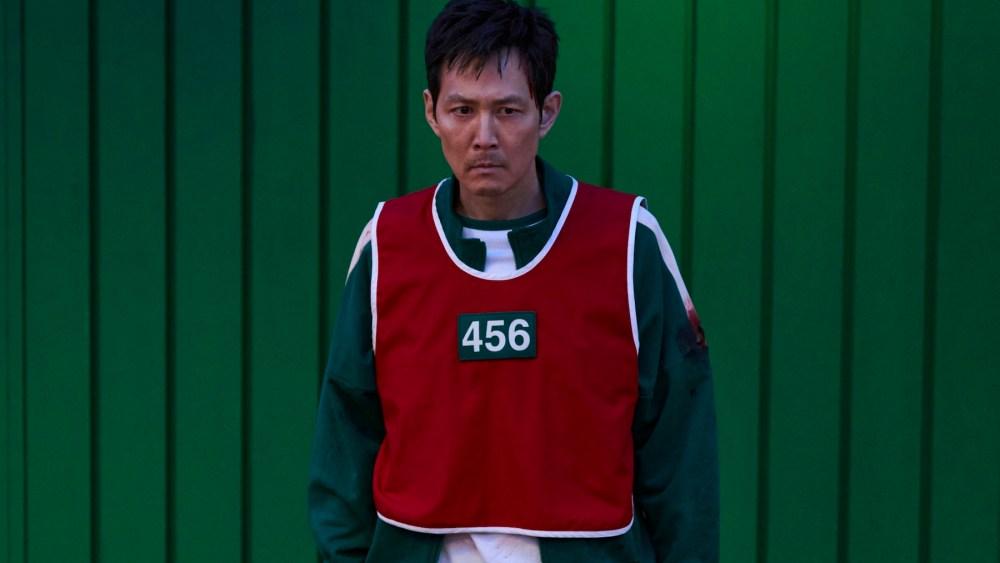‘Squid Game’ Creator Reveals Why Original Ending Was Scrapped
SPOILER ALERT: This article contains major spoilers from the “Squid Game” series finale, now streaming on Netflix.
The ending of Netflix’s “Squid Game” is tragic and uplifting all at once, with our protagonist giving his life and the main antagonist having a change of heart as a result.
Gi-hun (Lee Jung-jae) kills himself so that the newborn daughter of Jun-hee/Player 222 (Jo Yu-ri) and Myung-gi/Player 333 (Yim Si-wan) is the (metaphorical) last one standing in the deadly competition. Then, In-ho/The Front Man (Lee Byung-hun) comes to collect the child from the arena, and ensures she is safe, issuing her the full winnings of 45.6 billion won by the end of the finale.
Series creator and director Hwang Dong-hyuk says that when he was first planning out the second and third seasons of the hit South Korean drama, which he had originally intended to only be a one-season show, he’d thought of a different conclusion.
“When I had a vague idea about what kind of story I wanted to tell through Seasons 2 and 3, I actually had a different ending in mind,” Hwang said. “And then as I went through the writing process, as I created my characters, as I laid out the foundation and the outline of the story, and as I drew out the map for Gi-hun’s character arc, I realized, this shouldn’t be the way this story ends — and this is a better ending, or the right ending, for this arc. And so there was actually a very drastic change in the ending compared to when I just had only a vague idea about the story, and then when I really got into the writing process.”
To be more specific, Hwang said: “In the finale, Gi-hun makes a choice, and originally, when I was just thinking about where the story was going to take me, it was actually the exact opposite choice.”
The choices Gi-hun ultimately makes clearly affected the Front Man in ways he did not expect back in Season 2, when he was posing as a player in the games and attempting to prove to Gi-hun that humanity was inherently selfish and evil.
“The showdown between the Front Man and Gi-hun began in Season 2, and it is about whose beliefs and whose values are right,” Hwang said. “It is really about a clash of their philosophies. And so in Season 3, it is going to be the ultimate showdown, and also a story that explores how these two characters affected and influenced one another.”
In part, what affects Gi-hun’s ability to hold to his morals in “Squid Game” Season 3, beyond his promise to keep Jun-hee’s baby safe — something he ends up doing when her own father tries to kill her in order to win — is a memory of his dear friend and fellow player from Season 1, Sae-byeok (HoYeon Jung). She comes to him in a vision when he’s faced with the chance to kill other players in their sleep, after the Front Man gives him a knife as his one chance to protect himself and the baby before the final deadly competition that could kill them both. When he sees Sae-byeok, she persuades him not to, saying, “You’re not that kind of person.”
“I think that the line that she delivers in that scene is one of the most important scenes in Season 1,” Hwang said. “The moment when Gi-hun is tempted to kill Sang-woo in his sleep, Sae-byeok tells him, ‘You’re not that kind of person,’ and that line is what really wakes him back to his senses. It touches his conscience and his humanity. And they’re very simple words, yet they are the most accurate words that really pierce through him. So I thought that in that moment, for Gi-hun to come back to his senses and come back to himself, it had to be those very simple but powerful words spoken by Sae-byeok, and I thought that would be the strongest tool that could stop his knife.”
While Gi-hun’s story is over — and Hwang has said this is the end of his own story for “Squid Game” (for real this time) — he notes that the final moments of the series finale — which features a Recruiter (played by Cate Blanchett) looking for participants in a Los Angeles-based version of the Squid Game — are intended to leave the franchise open for potential spinoffs.
“I guess you could say that in a way, because when you watch the finale, while it has a true closure, I think you can still feel a sense of some kind of longing or lingering,” Hwang said. “So I think, maybe, someday, if the opportunity allows and the timing is right, maybe there’s room for other stories.”


